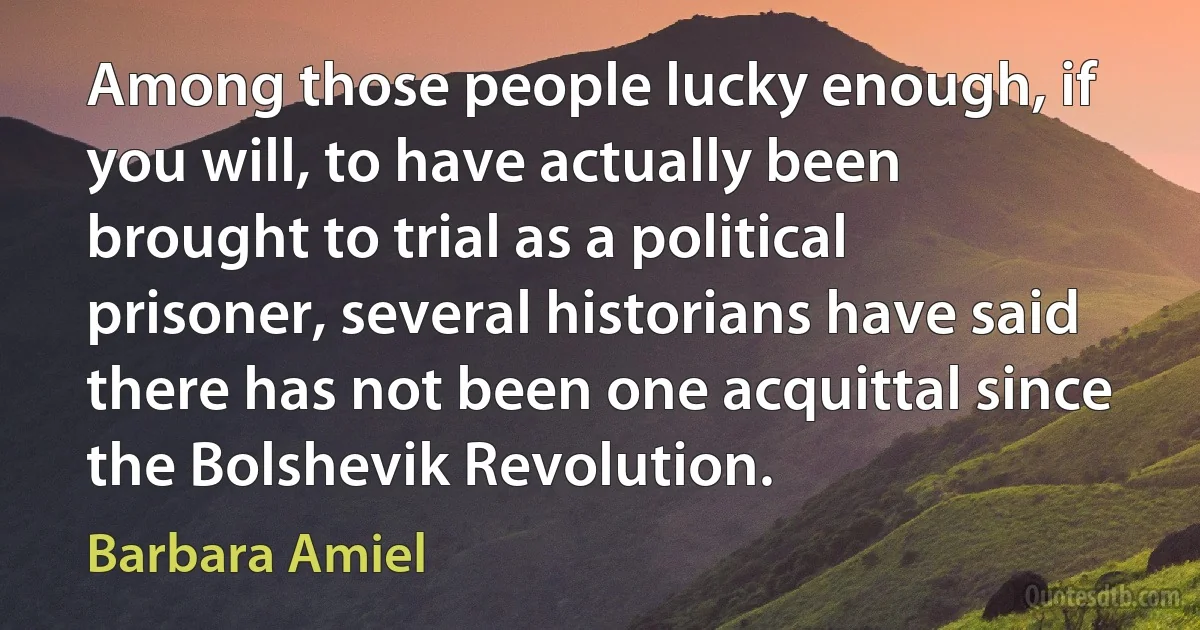Bolshevik Quotes - page 2
Some Western Church leaders don't care about [persecuted believers]. The names of the martyrs are not on their prayer lists. While they were being tortured and sentenced, the Russian Baptist and Orthodox official leaders who had denounced and betrayed them were received with great honor at New Delhi, at Geneva, and at other conferences. There they assured everyone that in Russia there is full religious liberty. A leader of the World Council of Churches kissed the Bolshevik archbishop Nikodim when he gave this assurance. Then they banqueted together in the imposing name of the World Council of Churches, while the saints in prison ate cabbage with unwashed intestines, just as I had eaten in the name of Jesus Christ.

Richard Wurmbrand
The dominant, almost general, idea of revolution - particularly the Socialist idea - is that revolution is a violent change of social conditions through which one social class, the working class, becomes dominant over another class, the capitalist class. It is the conception of a purely physical change, and as such it involves only political scene shifting and institutional rearrangements. Bourgeois dictatorship is replaced by the "dictatorship of the proletariat" - or by that of its "advance guard," the Communist Party. Lenin takes the seat of the Romanovs, the Imperial Cabinet is rechristened Soviet of People's Commissars, Trotsky is appointed Minister of War, and a labourer becomes the Military Governor General of Moscow. That is, in essence, the Bolshevik conception of revolution, as translated into actual practice.

Emma Goldman
National Socialism is a form of Socialism, is emphatically revolutionary, does crush the property owner as surely as it crushes the worker. The two regimes, having started from opposite ends, are rapidly evolving towards the same system-a form of oligarchical collectivism. . . . It is Germany that is moving towards Russia, rather than the other way about. It is therefore nonsense to talk about Germany ‘going Bolshevik' if Hitler falls. Germany is going Bolshevik because of Hitler and not in spite of him.

George Orwell
When the news of the Russian Bolshevik Revolution of November 1917 burst upon the world, American workers learned for the first time of a man named Vladimir Lenin-through this great event in human history, the beginning of socialism. We also learned some new words, which became part of the language in no time, "Bolshevik" and "Soviet," among them. Even those of us who were left-Socialists and IWWs knew practically nothing of the Russian Socialist movement, except that we had great sympathy with its long, agonizing struggle to overthrow the tsar's cruel and bloody regime. Overnight, "Bolshevik" became a household word, even to those who did not know it merely meant "majority," and referred to a political division in the Russian Social-Democratic Labor Party. "I am a Bolshevik from the crown of my head to the tip of my toes!" said Debs. "Damned Bolsheviks!" employers shouted at militant workers and union organizers. All strikers were "Bolsheviks," of course.

Eugene V. Debs
We must not be rigid. We must not become conservative as is the unhappy state of some of our Liberal leaders to-day, as did the French Revolution of 1789, as has, in many respects, the Russian Bolshevik Revolution of 1917. We need the fresh air and free challenging thought of my favourite poet, Robert Burns, who was, I think, a Socialist agitator before an organised Socialist movement was born.

Herbert Morrison
The classics of Socialist and Anarchist literature seem at mid-century to speak a foolish and naïve language to minds hardened by two generations of realpolitik.
It was not just the sophisticates and the reformers who had no belief in the validity or endurance of the system. Everybody in what they used to call the master class, from the Pope to William Howard Taft, believed in his bones that the days of his kind were strictly numbered and found wanting. What happened instead of apocalypse and judgment was a long-drawn-out apocalypse of counterrevolution against the promise and potential of a humane civilization. It began with the world economic crisis of 1912, and the First and Second World Wars and the Bolshevik Revolution have been episodes, always increasing in violence and plain immorality, in the struggle of our civilization to suppress its own potential.

Kenneth Rexroth
For me as a British Conservative, with Edmund Burke the father of Conservatism and first great perceptive critic of the Revolution as my ideological mentor, the events of 1789 represent a perennial illusion in politics. The French Revolution was a Utopian attempt to overthrow a traditional order - one with many imperfections, certainly - in the name of abstract ideas, formulated by vain intellectuals, which lapsed, not by chance but through weakness and wickedness, into purges, mass murder and war. In so many ways it anticipated the still more terrible Bolshevik Revolution of 1917. The English tradition of liberty, however, grew over the centuries: its most marked features are continuity, respect for law and a sense of balance, as demonstrated by the Glorious Revolution of 1688.

Margaret Thatcher

